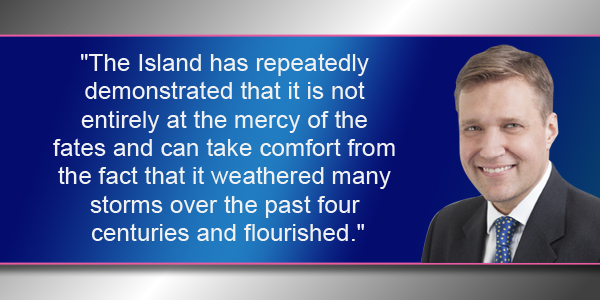Garrod: Dealing With Heightened Uncertainty
The election of Donald Trump as US President is causing anxiety in many business circles, and Bermuda is not exempt from these challenges, Bermuda lawyer Charis Garrod has said.
Mr. Garrod, a partner in the Bermuda office of law firm Conyers Dill and Pearman told Global Reinsurance that notwithstanding these challenges, he believes that Bermuda should be able to weather this current tide of political uncertainty, particularly facing its most important industry: insurance and reinsurance.
He noted that while the “decision last summer of British voters to leave the European Union caught many observers by surprise, in Bermuda, there have been a number of very positive developments that have allowed the island to position itself well to take advantage of some of the current global uncertainties around Brexit.”
Having obtained Solvency II status already, Mr. Garrod noted that Bermuda could provide UK reinsurers with the opportunity to sell reinsurance into Europe in the event that the UK loses its Solvency II status.
He said, “There is still little clarity about what the UK re/insurance market’s relationship will be with Europe post-Brexit and many businesses are weighing up a variety of contingency plans.”
He noted however, that Bermuda has an established global reinsurance track record and “would certainly be on the radar of London-based carriers as they try to plot a way forward after Brexit becomes a reality.”
Mr Garrod stated that Bermuda, like many countries, is facing an uncertain future. But he said there is reason for optimism as “the island has repeatedly demonstrated that it is not entirely at the mercy of the fates and can take comfort from the fact that it weathered many storms over the past four centuries and flourished.”



Whilst it is true, historically, that Bermuda has weathered many storms, for much of our history our ability to do so was underpinned by the island’s importance as a naval and military base. Unfortunately for us, that role is itself now history, and we are much less important a place than we used to be. Apart from the reinsurance industry that has been developed here, Bermuda is no longer a place of any real high-level consequence to anyone other than ourselves, and that does leave us more economically vulnerable than was the case for most of the last two-and-a-half centuries or so. American policy changes once did much to destroy what had been a flourishing agricultural and horticultural industry here, and although one hates the thought, history could repeat itself with our reinsurance industry, leaving us scraping a living with a much-diminished hospitality industry that could not support our population in anything like the style to which we have grown accustomed. Sadly, many Bermudians seem to continue to think that the world somehow owes us a living.